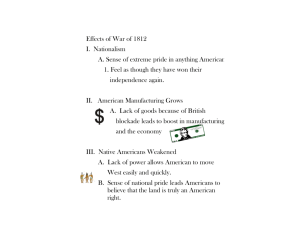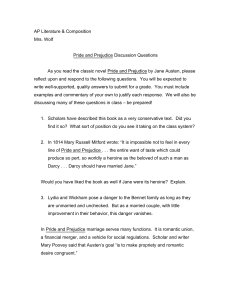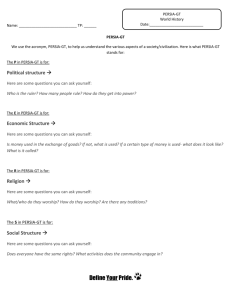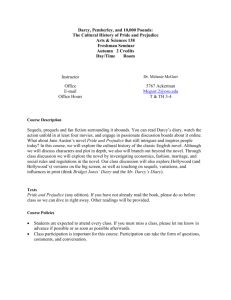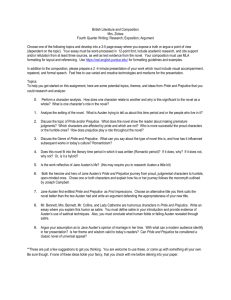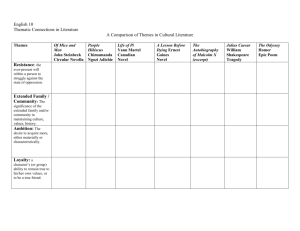Seeking Jane in Foreign Tongues - The Jane Austen Society of
advertisement
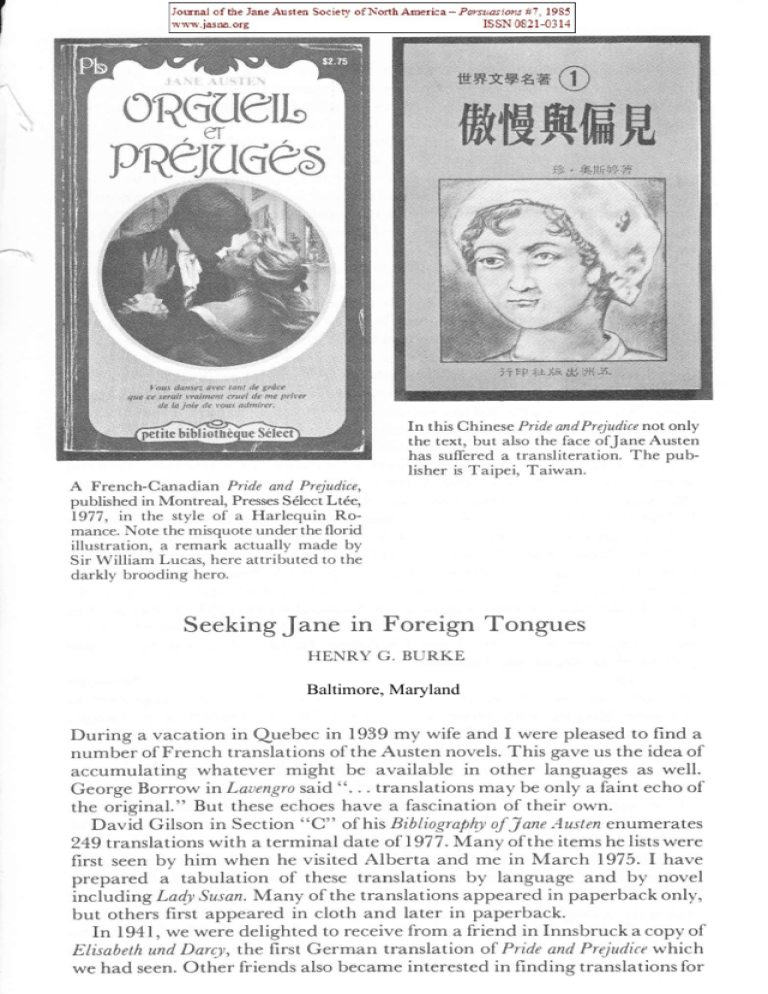
In this Chinese Pride and Prejudirr not only
the text, but also the face ofJane Austen
has suffered a transiiteration. The publisher is Taipei, Taiwan.
A
French-Canadian Pride and Prejudice,
published in Montreal,
1977,
Presses Sdlect
in the style of a Harlequin
Lt6e,
Ro-
mance. Note the misquote under the florid
illustration, a remark actually made by
Sir William Lucas, here attributed to the
darkly brooding hero.
Seeking Jane
in Foreign Tongues
HENRY G. BURKE
Il6
West University Parkway, #1318, Baltimore, N{D 212I0
Baltimore, Maryland
a vacation in Quebec in 1939 my wife and I were pleased to find a
number of French translations olthe Austen novels. This gave us the idea of
accumulating whatever might be available in other languages as well.
George Borrow in Lauengro said ". . . translations may be only a faint echo of
the original." But these echoes have a fascination of their own.
David Gilson in Section "C" of his Bibliograpfu of Jane Austen enumerates
249 translations with a terminal date of 1977. Many of the items he lists were
first seen by him when he visited Alberta and me in March 1975. I have
prepared a tabulation of these translations by language and by novel
including Za d1 Susan. Many of the translations appeared in paperback only,
but others first appeared in cloth and later in paperback.
In 194 I , we were delighted to receive from a friend in Innsbruck a copy of
Elisabeth und Darc1, the first German translation of Pride and Prejudice which
we had seen. Other friends also became interested in finding translations for
During
l8
Persmsions
No.
7
us, so that we soon wound up with a Russian Pride and Prejudice, a Chinese
Pride and Prejudice, and three volumes inJapanese, which included Pride and
Prejudice and Persuasion. As souvenirs of friends' trips to South America,
Spanish and Portuguese translations also arrived. We were amazed to find
the Scandinavian countries had fallen in line, particularly Finland which
had published a complete set of the six novels.
Most surprising of all was an encounter in Copenhagen when we found
that there had been a Danish translation of Ladl Susan. The book unfortunately was out of print but a call to the publisher revealed that in addition
to a defective copy they also had a perfect copy, which they would be happy
to present to us. Needless to say, we travelled across Copenhagen to acquire
this treasure. Greece, Holland, Belgium and Yugoslavia also made their
contributions. Many of these were ephemeral paperbacks, probably inspired
by the Pride and Prejudice movie with Laurence Olivier and Greer Garson.
Although our first translations had been in German and French, we soon
found that these were far outstripped by the 28 volumes which we acquired
in Italian. Garzanti published Emma in 1951 and 1965, with two different
introductions by Mario Praz. Mondadori and Rizzoli also produced scholarly translations, frequently with fine notes and introductions. In these translations, Pride and Prejudice le d the list with Emma trailing behind. Persuasion and
Mans.field Park also came in frequent editions.
While we were unable to cope with the texts, we could struggle over the
titles because frequently original efforts were made by the translators instead
of merely accepting the English version. A French translation of Persuasionin
1822 appeared as La Famille
Elliot.In 1959, the
same idea was adopted by an
Italian translator, who published Emma as La Famiglia Woodhouse. The idea
of using personal names instead of abstract titles like Serce and Sensibility,
Pride and Prejudice and Persuasion goes back to the first American edition of
Pride and Prejudice, which appeared as Miss Elizabeth Bennet. A Dutch translation used the title The Bennit Sisters. Sense and Sensibilitl seemed to produce
special difficulty for the translator. In Amsterdam in 1950, it appeared as
Feeling and Understanding, and a 1948 French translation published in Lausanne appeared as The Heart and Tlu Reason. In Spanish and Italian, it was
published as Reason and Sentiment.
The abstract titles were most generally modified in translation. Persuasion
appeared as Anne Elliot in German; J\torthanger Abbelt also appeared as
Catherine Morland with either a "C" or a "K" in French or in Italian.
Perhaps, the sentimental idea was carried too far in an Italian translation of
which appeared as Ritorno A Te.
In Jane Austen: Bicentenarlt EssaTs published by the Cambridge University
Press, Andrew Wright presents a sampling of translations under the title
"Jane Austen Abroad." With the help of specialists in the various languages,
Persuasion,
he uses three texts from Pride and Prejudice as tests ofthe effectiveness of Pride
and Prejudice in Chinese, German, Spanish, Romanian, Russian and Swedish.
For his sample texts from Pride and Prejudice, he selects the first chapter, Mr.
Collins' letter, and the interview between Elizabeth and Lady Catherine.
He finds that in many instances the subleties are not translatable and
strangely enough, the situations might appear more familiar to a Chinese
reader than to a Mexican reading the Spanish translation. He also discusses
the title Pride and Prejudice and points out that the word "pride" has both a
negative and positive meaning. In Romanian, these two meanings were
1**tN
1'13
:]:nrln
A Hebrew
Persuasion published by Keter
(Crown), Jerusalem, 1983.
!1li) DIUD'I
e-;-1@>
JUo"|N
A Hebrew Pride
'l'trzf,
and Pr ej udice
i"tlllJ
=@\=:
published by
Maariv Book Guild, Tel Aviv, 1984.
translatable by different words. In German, the word "Stolz" emphasizes
the negative meaning carrying with it the sense of arrogance. Thus, the
meaning of the words take on a diflerent colouring in different languages.
When I was in Tel Aviv in 1975, a cousin told me how much she enjoyed
Jane Austen in English but was astonished to hear that there had been a
Hebrew translation of Pride and Prejudice in 1952. She thought it incredible. I
o{Iered to send her photocopies of the first chapter and when she had an
opportunity to read them, found that the translator had succeeded in
capturing the historical milieu ofJane Austen. The Hebrew title was also
interesting-instead of the alliterative title, the translator used a rhyming
title, Ahaua V'gaua. This means love and pride but the Hebrew word for pride
carries the pejorative implication of arrogance or haughtiness like the
German "stolz."
In addition to the approach which Andrew Wright used, it might be
interesting to compare various translations of the same novel in the same
language. Judging by the number of Italian translations of Emma and the
numerous Italian and German translations of Pride and Prejudice, this might
be a good starting point. Certain passages have always been recognized as
particularly resistant to translation. Naomi Royde Smith selected as her
favourite example of the untranslatable, the dialogue between Mr. and Mrs.
Bennet after Elizabeth has refused Mr. Collins and Charlotte Lucas has
accepted him.
20
Perstusions No. 7
"Indeed, Mr. Bennet," said she, "it is very hard to think that ChariotteLucasshould ever be mistress ol this house, that I should be forced to make way for
her, and live to see her take my place in it!"
"My dear, do not give way to such gloomy thoughts. Let us hope for better
things. Let us flatter ourselves that I may be the surwivor."
This was not very consoling to Mrs. Bennet, and, therefore, instead of
making any answer, she went on as before,
"I cannot bear to think that they should have all this estate. Ifit was not for
the entail I should not mind it."
"What should not you mind?"
"I should not mind any thing at all."
"Let us be thankful that you are preserved from a state olsuch insensibility."
"I never can be thankful, Mr. Bennet, for any thing about the entail. How
any one could have the conscience to entail away an estate from one's own
daughters I cannot understand; and all for the sake of Mr. Collins too! Why
should he have it more than anybody else?"
"I
leave
it to yourself to determine," said Mr.
Bennet.
Recent and exciting translations which postdated the Gilson list were
Hebrew translations of Pride and Prejudice and Persuasion. Like other translations, the translator, Naomi Carmel, has taken liberties with the Persuasion
title. The Hebrew title, Hataltet Laae,literally means Inclination of Heart.I am
not sure whether the translator was thinking of Anne's heart or Captain
Wentworth's. She could have meant either.
The title Pride and Prejudice has been literally translated into Hebrew. The
Hebrew phrase for prejudice, "Mishpat Kadum," means ancient judgment
and is reminiscent ofFersl Impressions. There is also a newtranslationof Emma
into Hebrew, but no copy has yet appeared in the United States.
David Gilson is updating the Bibliographl for a new edition. How many
numbers will be added to Category "C" and into what new and strange
Ianguages will it take us?
"Lop't and Crop't"
see Jane Austen write to her sister Cassandra about the length of
Pride and Prejudice, that "I have lop't and crop't it... successfully," it is
possible that we are privy to a joke between the sisters, in the form of a
Iiterary allusion. In "The Critic" (1779), Sheridan has a play,wright complain
about the way actors have cut his dialogue: "Here is such a lopping and
When we
cropping. . ."
Jane Austen had earlier referred to "The Critic" in her juvenile "The
History of England," sending readers who wished to know more about Sir
Walter Raleigh to the play for "many interesting anecdotes." "The Critic"
also contains the stage direction "They faint alternately in each other's
arms," which may be echoed in Jane Austen's youthful "Love and Friendship" when Laura and Sophia faint alternately on a sopha.-Edith Lank
